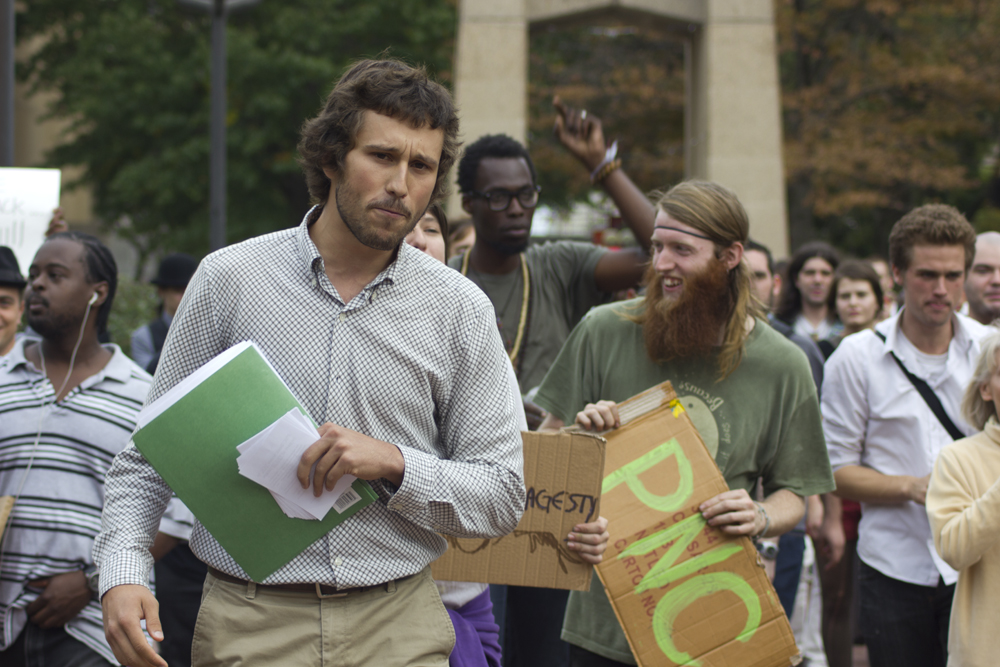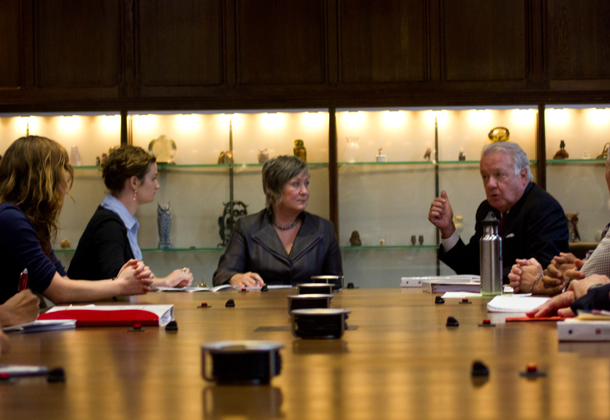Protesters targeted the Board of Trustees for a social and environmental cause at its public meeting.
Drawing in a large audience, yesterday’s public Board of Trustees public session meeting was filled with students and activists, many of whom were participants in Occupy Philadelphia.
The group of activists, which rallied at the Bell Tower prior to staging the action at the meeting, sought to address the Board to challenge the university’s relationship with PNC Bank and the bank’s connection to corporations that practice mountaintop removal coal mining. The practice has been the subject of scrutiny for environmental concerns and health hazards.
Inspired by Earth Quaker Action Team, a nonprofit that campaigns against the popular bank, activists contend that the bank is the No. 1 financier of corporations that partake in the controversial process.
The packed Feinstein Lounge on the second floor of Sullivan Hall was filled with demonstrators equipped with signs against PNC and in support of the Occupy movement.
Organizers instructed members of the protesting group to be respectful and to not block the exits, despite what early plans for the action called for.

The Board convened at around 3:40 p.m., first reaffirming Patrick J. O’Connor as board chairman and soon after voting on a number of recommendations presented by its committees.
Trustees approved a recommendation to re-elect six board members for a four-year term, beginning yesterday, including President Ann Weaver Hart, who recently announced her resignation from the presidency. The other members include Judith A. Felgiose, Lon R. Greenberg Susanna E. Lachs, Solomon C. Luo and Jcacetti.
In approving a number of projects presented by the Facilities Committee, the Board approved the construction on and expansion of the Edberg Olson football practice facility, at a cost not to exceed $9,050,000.
Before ending the meeting, O’Connor said the board would not publicly comment on PNC and the mountaintop removal coal mining process, but invited students interested in discussing the issue to speak informally in a nearby conference room.
As O’Connor adjourned the meeting and trustees began to shuffle out the room, senior religion and visual anthropology major Brianne Murphy, an organizer of the event, stood up, informally addressing the board about the issue.
“It is on behalf of my fellow Temple students and members of the Temple community that I request your attention,” Murphy said, as activists and members of the media swarmed around her.
While O’Connor attempted to respond to Murphy’s informal address, Murphy continued to speak about the issue.
“We invite the Board to join us in advocation of this sector exclusion and termination of this practice,” Murphy said. “If the Board will not join us in this advocation, the Temple student body would like to inform the Board that we will not stand for our educational institution’s continual contribution to such a destructive process.”
Murphy said her fellow activists were requesting Temple terminate any relationships with companies like PNC believed to be affiliated with mountain top removal coal mining.
“It is for the health of our brothers and sisters in Appalachia that we work. It is for the beauty and reverence of the land that we work. And it now that we demand change,” Murphy said, as the activists began chanting.
As most of the group’s members exited Sullivan Hall, Murphy and a few fellow demonstrators, including one other student and 2009 alumnus Luke Byrnes, then met with university officials room in an adjacent conference room.
At the small meeting, O’Connor and Hart said the issue would be discussed by the Board’s Investments Committee. O’Connor was unsure if the topic was on the agenda for its Oct. 26 meeting.
“We will look at some of the issues and [decide] if we think that there’s a reason to act, and I’m not suggesting there is or there isn’t, but that’s all we can say to you,” O’Connor said.

One inquiry by the students requested detailed information about Temple’s involvement with PNC and any investments it may have with the bank.
“There’s information that you’re entitled to receive as a member of the public, there’s information you’re entitled to receive as a student here, I don’t know whether that’s one of them. And if it is, then we’ll give it to you,” O’Connor said.
Hart said the university has contractual relationships with many different financial services and banks.
Lina Blount, a junior growth and study of cities major at Bryn Mawr College, said the trustees present in the room seemed to be responsive to the activists.
“I don’t know if that response was to just quell the energy,” Blount said. “Maybe they’re sincere. I want to take them at their word.”
O’Connor, after the meeting, said he wished more activists had taken the him up on the discussion.
“I was disappointed with the activists, when we announced that we would meet and have a dialogue with them in this room and there was that play for TV cameras, which I find personally offensive,” O’Connor said.
Hart said the university prides itself on offering a platform for free, legal speech, despite any personal feelings about the message.
“I was afraid they were going to try to impede the exit of some of our trustees and we didn’t want to have a scene – and we didn’t have a scene,” O’Connor said.
Temple Student Government Student Body President Colin Saltry said students with these types of concerns should utilize his organization as a means of reaching the Board and administrators.
Meanwhile, the majority of the protesting group returned to the Bell Tower.
“We’re trying to put pressure on Temple. We’re trying to move through the Board of Trustees,” senior political science major Danny Teichman said. “I’m generally an environmentalist. [MTR] is important, this issue, to Pennsylvania. This is something I can do tangibly, here. Now.”
Byrnes said that, although the group that organized the event has no formal name or leadership, they wish to be an autonomous student group. He added that he would act as a liaison between students and EQAT.
“We make our own rules,” he said.
Amelia Brust and Angelo Fichera can be reached at news@temple-news.com.



I appreciate this level of detailed reporting, and the concerns that these activists have brought to Temple. I’d like to see Temple alumnae informed about the connection between Temple and PNC bank, and about PNC bank’s investment in mountaintop removal coal mining.
For some reason, I want to punch that hippy in the background.